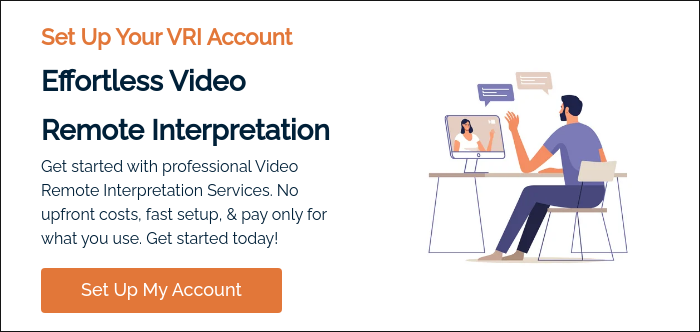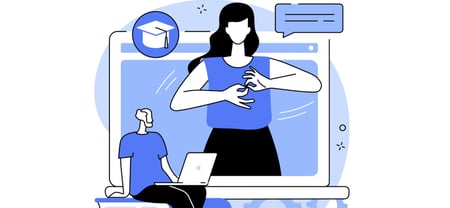
Video Remote Interpretation (VRI) generally involves more complex processes than Over-The-Phone Interpretation (OPI). To clarify, VRI employs video technology to facilitate communication for individuals who are deaf or hard of hearing. It enables them to converse in a foreign or even their native language using sign language.
Getting the right VRI service partner is important, and here at LinguaLinx, we have first-hand experience with helping people with their VRI needs.
As a Language Services Provider (LSP), we understand that the decision-making process carries significant weight and involves considerable pressure to make the correct choice.So, how do you make the right decision? With so many LSPs offering VRI, what are you really looking for? What are the questions you should ask to determine who’ll be the best fit for your business? Who will you ultimately give your business to?
That's exactly what this article is going to help you solve. We'll arm you with the questions you need to ask any LSP you're considering working with. Doing so is going to help you choose the best language service provider as your long-term partner for all your interpretation, translation, and transcription needs.
Do You Have Experience In Our Industry?
Having industry-specific experience ensures the accuracy of interpretation. This implies that the interpreter is well-versed in your business lingo and nuances. This understanding provides them with relevant context, which they can effectively convey during communications.
After all, different industries speak in very different ways, even if they’re using the same language.
Financial services, legal, manufacturing, technology, and every other industry, for that matter, tend to have their own languages within the language that can be misconstrued if the interpreter is just translating words. Contextual understanding is critical.
What Is Your Process Like?
The process of working with an LSP shouldn't be complicated. The true expertise lies in the translation, and your LSP should strive to streamline the process to align with your preferred work style.
It's beneficial to understand who your primary contact will be and how much notice they require to arrange VRI services in your frequently used languages. Find out if VRI needs to be pre-scheduled always, or if they also offer an on-demand service.
Furthermore, it's essential to explore how they handle urgent or unexpected requests. In a global marketplace, flexibility can be paramount. A responsive LSP that can accommodate sudden changes or additional language requirements can be a valuable partner in your business operations.
What Hard Costs Are We Going To Incur?
Do you need to purchase hardware or software? What is the minimum spec your laptop needs to be to have a good connection over a solid internet connection? Can you operate it from a tablet or, even better, your phone? Is it as simple as just downloading an app?
Consider what your individual requirements are going to be, and make sure you know the equipment you need. Are you always going to be in an office with stable internet, or are you going to be in a remote location where you’ll have to rely on 5G or even 4G?
What Is Your Quality Assurance (QA) Process?
Every LSP is going to tell you that their QA process is watertight. The question is, how do you know this before you’ve worked with them? Their QA is an extension of yours because you’re doing your due diligence to bring them in as a language partner with you.
The best thing to do is check that they have the most widely recognized international standard for the translation industry – ISO 17100. This means they open themselves up to an audit every year where an independent industry auditor checks their processes.
Are You HIPAA-Compliant?
HIPAA, the U.S. Health Insurance Portability and Accountability Act, compliance signifies that the LSP has implemented rigorous processes to ensure the security and confidentiality of protected health information.
Such compliance is not only a testament to their commitment to protecting sensitive information, but it also indicates their understanding of the paramount importance of safeguarding individuals during any interpretation service.
In addition, a HIPAA-compliant LSP will be equipped to handle projects within the healthcare sector effectively. They'll have a profound understanding of the industry-specific terminologies, regulatory requirements, and unique challenges of the healthcare industry.
Working with a HIPAA-compliant LSP can provide the assurance that your sensitive health-related information is handled with the utmost care and professionalism.
What Is Your Account Management Plan?
When you have a VRI request, who do you interact with? Will it be a different individual each time, or do you have a dedicated account manager who familiarizes themselves with your business needs? Ideally, this person should function as an extension of your team, offering strategies to streamline the VRI process and make it more cost-effective for you whenever possible.
In the additional context, it's also essential to understand how the account management structure supports your communication requirements.
A robust plan ensures prompt responses to your queries and timely resolution of any issues. This also includes their proactive approach towards understanding your future needs, evolving industry trends and technology, and continuously working on enhancing the quality and effectiveness of their services.
The goal should be a partnership that goes beyond transactional interactions and contributes significantly to your business success.
Are Your VRI Services Available 24/7?
This aspect is crucial, as dealing with multiple languages often means navigating various time zones. When an LSP claims to provide 24/7 services, it's essential to clarify if this includes public holidays like Christmas or other national holidays, and which nation's holidays their interpreter roster observes.
For instance, if you require Burmese sign language interpretation during the Full Moon Day of Tabaung (a significant Buddhist holiday in Myanmar) would your LSP be able to accommodate this request?
Additionally, it's worth asking about their contingency plans. Do they have sufficient backup interpreters to cover unexpected absences or simultaneous requests? Understanding their capacity to handle unusual or urgent situations gives you a clearer picture of their ability to meet your business needs consistently and reliably.
How Many Languages Can You Provide VRI For?
You don’t want to be going through this procurement process twice, that’s for sure. So, even if your current requirement is VRI for a new German client, see if you can project where your business might be going in the future.
The more range of languages your LSP can help you with, the less likely you’ll need to swap LSPs in the future.
What Are Your Rates?
While VRI rates tend to fall within a certain price bracket, they’ll vary based on a number of factors. If you can give your LSP a specific brief, then their quote will be more accurate. This is the kind of information you’ll need to supply them with:
- The target language – rarer languages tend to cost more because there are fewer interpreters.
- Your industry – the complexity of your industry will be a factor.
- Your timescales – can you pre-schedule, or do you not know when you’ll need to talk to your client, so you’ll need an on-demand service?
- The frequency you’ll need VRI – Is it every week for a specific meeting so you can sort out a package rate?
Some LSPs charge by the minute, while others charge by the hour. Be aware that the ones that charge by the hour often have a minimum booking time (two hours, for example), so you’ll have to weigh up what’s going to work best for you. Typically, sticking with hours, you’ll be looking at somewhere between $40 and $80 an hour.
Are You The Right Fit For Us?
Of course, there are other questions you’ll want to ask to find the right VRI partner, but these will get you going in the right direction. Once you know their processes, that they care about the quality and security of their interpretation, and that their rates are within a reasonable range, then you’ll have a good feel for them as a business.
Ultimately, you want an LSP that has working practices and values that fit yours. They’ll become an extension of your brand, so getting it right at this stage is worth taking a little time and asking the right questions.
Get A Quote For Your Video Remote Interpretation Needs
We hope this article has given you valuable insights into what to look for in a Video Remote Interpretation (VRI) partner. From industry experience and quality assurance to cost transparency and flexibility, choosing the right provider ensures smooth and effective communication now and in the future.
At LinguaLinx, we’re ready to support your VRI needs. With ISO 17100 and ISO 9001 certifications and over 20 years of experience, we guarantee quality, accuracy, and professionalism in every project. Our clients across various industries trust us to deliver reliable interpretation services tailored to their unique needs.
Contact us today for a free, no-obligation consultation. Let’s work together to ensure your communication is clear and effective—no matter the language or situation.






